- Home
- Virginia Hamilton
M.C. Higgins, the Great
M.C. Higgins, the Great Read online
M.C. Higgins, the Great
Virginia Hamilton
for
Susan Hirschman
Contents
1
2
3
4
5
6
7
8
9
10
11
12
13
14
A Biography of Virginia Hamilton
1
MAYO CORNELIUS HIGGINS raised his arms high to the sky and spread them wide. He glanced furtively around. It was all right. There was no one to see his greeting to the coming sunrise. But the motion of his arms caused a flutter of lettuce leaves he had bound to his wrists with rubber bands. Like bracelets of green feathers, the leaves commenced to wave.
M.C., as he was called, felt warm, moist air surround him. Humidity trapped in the hills clung to the mountainside as the night passed on. In seconds, his skin grew clammy. But he paid no attention to the oppressive heat with its odors of summer growth and decay. For he was staring out over a grand sweep of hills, whose rolling outlines grew clearer by the minute. As he stood on the gallery of his home, the outcropping on which he lived on the mountainside seemed to fade out from under him.
I’m standing in midair, he thought.
He saw dim light touch clouds clustered behind the eastern hills.
Bounce the sun beside me if I want.
All others of his family were still asleep in the house. To be by himself in the perfect quiet was reason enough for him to wake up way early. Alone for half an hour, he could believe he had been chosen to remain forever suspended, facing the hills. He could pretend there was nothing terrible behind him, above his head. Arms outstretched, picture-framed by pine uprights supporting the gallery roof, he was M.C. Higgins, higher than everything.
M.C. smiled. Going to be my best day, he told himself. He let his arms fall, and sniffed a bracelet of cold, fresh vegetable. He bit gently into a lettuce stem, pulling at it until he had an entire leaf to chew.
Will it really be mine—this mountain? Daddy says it will one day.
He loved the mountain, its long, lingering dawns. But he frowned, squinting off at the hills with night still huddled in their folds.
Now it won’t ever be mine.
He shivered as with a sudden chill, and stepped off the gallery.
Pay no mind to what Daddy says.
“We have to leave it,” he said softly, “and that’s a shame.”
M.C. walked quickly to the edge of the outcropping where tangled undergrowth made deep shadows. He avoided looking at the side yard with its burial ground covered with car junk, and his prize like no other.
See it later, he told himself, thinking of the prize. See it when the sun is making it shine.
Slipping through the undergrowth, he took one of the paths down the mountainside. Soon he was striding swiftly through piney woods. The leaf bracelets wafted on air as though in flight, as he plunged and wove among the trees.
M.C. was barefoot, wearing carefully ironed blue jeans and a brown, faded T-shirt. The shirt was the color and fit of a second skin over his broad shoulders. Already he was perspiring. But his motions remained lithe and natural, as he moved easily among trees and shade. Pushing through pine boughs, he continued on his errand.
Bet I haven’t caught a single rabbit, just like on Thursday and Saturday, too.
He had to check all three of his rabbit traps and then get home to wait for this new dude to arrive.
They were saying in the hills that some new kind of black fellow had come in with a little box of a tape recorder. All slicked down and dressed to kill, they were saying he was looking to put voices on the tape in his box.
And now M.C. knew how he could get around his daddy and get his mama and his brothers and sister off the dangerous mountain. The idea had come to him after he heard about the dude. Two days ago, greeting the sunrise, there it began in his mind, growing and growing with each new ray of light.
Dude going to make Mama a star singer like Sister Baby on the radio, M.C. thought. We’ll have to travel with her—won’t that he something? But Mama is better than Sister Baby. He’ll make her the best anybody ever heard.
The dude had already been told about M.C.’s mother and the kind of voice she had.
What if he gets to home when I’m gone? No, too early for him. He’ll have to walk it, M.C. thought. Probably lose himself about twice before he makes it up the mountain.
M.C. lived three miles inland from the Ohio River. His rabbit traps were strung out at the edge of a plateau between Sarah’s Mountain, where he lived on the outcropping, and a low hill called Kill’s Mound. On the Mound lived the Killburn people, whose youngest son was the same age as M.C.
M.C. smiled to himself as he moved like shadow through the damp stillness. Ben Killburn was just his age but only half his size. M.C. was tall, with oak-brown skin, like his mother; yet he was muscular and athletic, like his father. He had a hard strength and grace that helped make him the best swimmer ever to come out of the hills. The first time he had tried to swim the Ohio River, a year and a half ago, he almost drowned.
His father, finding him exhausted, vomiting on the river bank: “You think that river is some mud puddle you can wade right into without a thought?”
And then, his father beating him with his belt: “A boat wouldn’t go into that water not knowing how the currents run. (Whack!) I’m not saying you can’t swim it (Whack!), as good a swimmer as you are. (Whack!) But you have to study it, you have to practice. You have to know you’re ready. (Whack-whack-whack!) I’ll even give you a prize, anything that won’t cost me to spend some money. (Wham!)”
M.C. left the path and plunged into weeds of ginseng and wild daisy in a clearing. Standing still a moment, he searched until he spied the first trap half-hidden. Cautiously he picked his way toward it, for he had placed the trap at the edge of a long, narrow ravine. Across the ravine was Kill’s Mound but he could hardly see it. An abundance of trees grew up from the bottom of the ravine, blocking his view. He couldn’t glimpse the Killburn land, or houses and barns at all.
M.C. stopped again. He gave off a soft call. Cupping his hands tightly around his lips, he pitched the call high enough to make it sound like a young turkey gobbling. He remembered that when he was a child out with his father, they often came upon a whole flock of wild turkeys. Now all such birds were rarely seen.
M.C. listened.
Deep in the ravine, there came a soft answering sound, a yelp of a hound puppy nipped on the ear by his mama.
Ben Killburn was there waiting, as M.C. figured he would be. And after M.C. checked his traps, he would have time to spend with Ben.
Calling like birds and animals wasn’t just a game they played. It was the way M.C. announced he was there without Ben’s daddy and his uncles finding out. M.C. wouldn’t have wanted to run into the Killburn men any more than he would want his own father to know he was playing with Ben. Folks called the Killburns witchy people. Some said that the Killburn women could put themselves in trances and cast out the devil. Killburn men and women both could heal a bad wound by touching, although M.C. had never seen them do it. Boys scattered around the hills never would play with Ben. They said it was because he was so little and nervous. But M.C. had played with Ben from the time he was a child and didn’t know better. When he was older, he had been told. Now he guessed Ben was like a bad habit he couldn’t break and had to keep secret.
The traps M.C. made were a yard long, a foot high and a little more than a foot wide. He had put them together from scraps of wood and chicken wire.
Better soon take them apart, he thought. Stack them,
so when we move. . . .
He checked them. Not a one of them is sprung, he said to himself.
Peering through the chicken wire, he saw that his lure of lettuce was still in place and rotting from two days of heat. The animal trails took the rabbits through the weeds into the ravine where they drank at a stream, and on to Mrs. Killburn’s large vegetable gardens.
Maybe her greens have gone sour, M.C. thought. Not one rabbit come even close.
Disgusted, he held the raised trapdoor in place. He reached inside and tore lettuce loose from the first trap. He threw the rotting lure as far as he could into the ravine. Cleaning out the other two traps, he took fresh lure from his wrist bands.
Just a waste of time, he thought, shoving lettuce into the traps. But I’d sure like to taste some wild meat.
Finishing the chore, M.C. fluffed up weeds where he had trampled them down, making the traps less obvious. Then he started down into the ravine, grabbing hold of a wood post of a vine bridge. The bridge hung across the ravine to a landing on Kill’s Mound.
My bridge, M.C. thought.
One time he had kept on thinking about how often Ben’s mother had to climb up the side of the ravine to go anyplace. Usually she carried one of her babies on her hip. Slowly it had come to him what could be done.
“Vines are thick,” he had told Ben. “You get your daddy and your uncles to cut them and make a weave.”
He told Ben that wood posts had to go in solid ground on each side of the ravine. He told how to soak the vines, then loop them at the top and bottom of each post, and how to weave the vines so they’d stay tight. How to tie them.
I figured it, M.C. thought, admiring the simple lattice weave of the bridge.
Only one trouble.
Ben was so used to living the same, he hadn’t trusted a new way of doing. It had taken Ben forever to make up his mind that M.C. knew what he was talking about. When he had finally told his father, Mr. Killburn dropped everything and set to work making the bridge.
Stretching himself out, M.C. held onto the post for as long as he could. Then he let go and plunged, running, sliding and falling down into the ravine. He had to keep watch for patches of seepage, which dried up in one place only to form again in another. The patches could be soft and muddy, or bottomless like sink holes. Growth covering them was yellow-green or black with rot.
Either way, M.C. thought, each is trouble.
He made it down the ravine without any danger to himself and into the midst of it, where the stream gurgled along.
Something swooshed over his head. M.C. ducked in a crouch. He smiled and turkey-gobbled softly. Staying down, he craned his head up and around to see.
Ben Killburn had come swinging out of the trees on the opposite side of the ravine, his hands and legs spidery tight around a strong, old vine. He swung back, swooshing through the air some four feet above M.C.’s head.
“Hurry up.” Ben silently mouthed the words as he glided, rising into the trees on the Kill’s Mound side.
The ravine was an ancient place, with trees taller than most others over the hills. Once there had been a river through it. Ben’s grandmother remembered all about it. She’d put on her bonnet and ride that river meander to the town of Harenton near the Ohio River.
Now there was only the stream and seeping wetness. Because the trees grew so huge, M.C. suspected that the river still flowed underground. Not only were they massive but they were entwined with vines as thick as a man’s arm. Maybe the vines were poison ivy grown monstrous from Killburn magic.
M.C. liked the idea of witchy vines.
Funny they never cause me to itch, or Ben, either.
The vines tangled up and up to the very tops of trees. They connected with other vines and other branches, forming a network that shut out hard sunlight. Dampness became trapped with heat, causing fog to hang eerily just above the ground.
Wouldn’t want to be caught down here in the night, M.C. told himself. He shuddered, picturing vines reaching for him and looping themselves around his neck.
M.C. jumped over the stream and headed for Ben waiting on a high branch. Ben’s unsmiling face was pale yellow and always looked slightly peaked. He had shocking red hair, thick and long. All of the Killburn children had the same hair, in varying shades of red.
As M.C. came nearer, Ben’s gray eyes lit up. He grinned, showing small, pointed teeth. He straightened his knees, then bent them, as if he would jump for joy.
M.C. always felt bigger and strong around Ben, like he wasn’t just anybody passing by. He was M.C. and he made a show of examining the vine he would use, which hung down the side of the tree trunk. He grabbed it above his head and braced his feet against the trunk. Leaning far back, he tugged hard on the vine. Positive it would hold his weight, he walked up the tree and climbed onto the branch next to Ben.
The branch twisted horizontally from the tree, searching for sunlight. To balance themselves, the boys had to stand still and hold tight to their vines. For a moment they stared at one another in a silent regard. M.C. liked Ben and felt sorry for his being small and alone when he didn’t want to be either. He admired Ben because Ben was a witchy. And he knew that Ben thought a lot of him, since he was like no other boy and would play with Ben. Tall and powerful, M.C. didn’t mind being by himself, could do anything well.
Between them was an unspoken agreement. Ben was never to touch M.C. with his hands and risk losing his only friend.
The problem for both of them was that they couldn’t walk a path together for fear M.C.’s father or others might see them. M.C. would walk the paths and Ben would stalk him, hidden in the trees. That way they could be together and have no trouble.
“I go first,” M.C. suddenly said. He shoved off the branch, swinging out through the ravine. He was carried in a long sweep through the ground fog. In an instant, he appeared shadowy, like a ghost riding lazily on thin air.
Vines are fine, he thought lightly. He felt the coolness of mist on his bare arms. But they aren’t the best ride.
M.C. reached the far side. Then Ben swung off the branch and rode low through the fog. Just above the stream, he passed M.C. on the way back.
“I got a ticket to ride,” M.C. sang softly as he passed.
Ben grinned with pleasure.
M.C. landed on the branch and pushed off at once. Again he and Ben reached the stream at the same time, from opposite directions.
“Hi, you bro’,” M.C. whispered.
“Hi, you M.C.,” Ben whispered back, holding tight to his vine.
In slow, ponderous sweeps, they rode back and forth. Their old vines creaked with the strain. The boys swung slowly, and finally they slowed completely.
M.C. caught up his vine with his feet. When he could reach it with one hand, he twisted it up and around his legs and wrapped it around his waist. He let himself hang there above the stream, with his feet dragging in the cool water. Ben did the same.
They swayed gently around in the stillness. Ben looked just as happy as he could be. M.C. was feeling pretty good himself, just listening and feeling the depth of silence. He even glanced at Ben’s hands. They were small and appeared almost ordinary, except each hand had six fingers. Ben had six toes on each foot. Folks said all the Killburn men had toes and hands the same.
Eying Ben’s witchy hands, M.C. assured himself that the sixth fingers weren’t wildly waving and making magic. They were the same as the other ten holding onto the vine. Only they were extra.
M.C. let the sound of the stream become distant. He could hear voices from the Killburn land nearby—snatches of words, their meaning lost on the mist. Dishes made their scraping noise. Chickens, clucking and fussing for food. Farther off, he thought he heard the deep cough and hum of machines.
Bulldozers, working so early?
Sound again from the house—a fretful cry of a child.
“Where’s your daddy now?” M.C. said softly to Ben.
“He’s at home,” Ben said. “And Uncle Lee and Unc
le Joe. No work until tomorrow but they fill up the icehouse by eveningtime.”
“Are they going to cross that swinging bridge any time soon?” M.C., didn’t like running into Killburn men.
“Not likely before afternoon,” Ben said. “Then I have to help them.”
If M.C. ran into the Killburn men, his father had warned him never to let them cross his path.
“And your mama?” M.C. said. “Haven’t seen her in a while.”
“She at home,” Ben said. “She was gone most of last night.”
“Getting out the devil?” M.C. said, respectfully. He tried to be polite when speaking of Mrs. Killburn’s power.
“Deliverin’ a baby,” Ben said.
“Oh,” M.C. said, and then: “Are her greens any good this year?”
“Nothing’s any good this year,” Ben replied. “My daddy says it will get worse with mining going on everywhere.”
“What does mining have to do with your mama’s vegetables?” M.C. asked.
Ben was silent a moment, as if he didn’t want to talk about it. Reluctantly, he said, “Well, Daddy and Uncle Joe went for miles north and east following the coal seam, looking for mining cuts. They didn’t go to Sarah’s Mountain because of what your daddy might do. But wherever else, they lay hands on the cuts. . . .”
“You mean they thought to work magic on the hills?” M.C. stared at Ben in disbelief.
“I’m just telling you what they had to do,” Ben said. “Daddy says it didn’t work straight off but that maybe it will slow the ruin down.”
“Naturally it didn’t work,” M.C. said. “That’s why folks stay clear of your father, for doing things like that.”
“He just can’t find a way to heal a mountain is all,” Ben said. Looking at M.C., his eyes were anxious, innocent.
“Shoot,” M.C. said and fell silent. He pictured Ben’s father pressing his hands on giant gashes made by strip mining. And it just about irritated him to death, he didn’t know why. Two years ago bulldozers had come to make a cut at the top of Sarah’s Mountain. They began uprooting trees and pushing subsoil in a huge pile to get at the coal. As the pile grew enormous, so had M.C.’s fear of it. He had nightmares in which the heap came tumbling down. Over and over again, it buried his family on the side of the mountain.

 The Planet of Junior Brown
The Planet of Junior Brown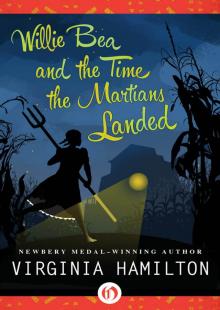 Willie Bea and the Time the Martians Landed
Willie Bea and the Time the Martians Landed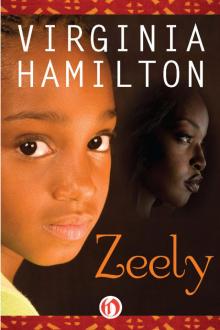 Zeely
Zeely Bluish
Bluish Mystery of Drear House
Mystery of Drear House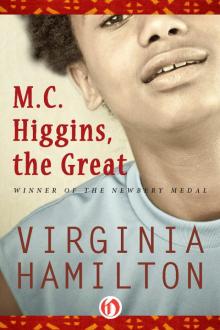 M.C. Higgins, the Great
M.C. Higgins, the Great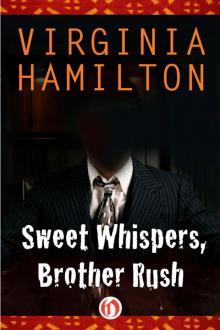 Sweet Whispers, Brother Rush
Sweet Whispers, Brother Rush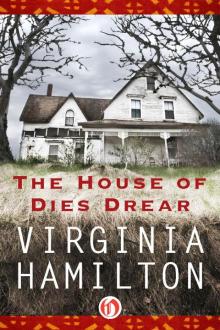 The House of Dies Drear
The House of Dies Drear Arilla Sun Down
Arilla Sun Down Cousins
Cousins